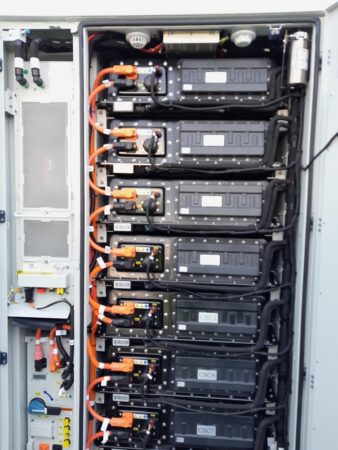Swansea’s revolutionary solar scheme gets £3.6m extension

The additional 1MW generated by the extension will increase the overall generation of power to 5MW, taking the total expected annual generation to five million kWh
In 2021 Morriston Hospital became the first hospital in Wales to develop a solar farm.
The project was successful in cutting their carbon emissions by 1,933 tonnes per year and work has now begun on a new £3.6m extension and battery energy storage system (BESS) which will deliver another 1MW of clean energy for Swansea Bay Health Board.
The BESS will allow for energy created during the daytime to be used after sunset, allowing more of the electricity generated to be used by the hospital.
In addition to the carbon savings, the solar farm and extension are expected to save over £1.2m in energy costs per year.
Des Keighan, assistant director of estates at the health board, said: “The solar farm has been a huge success in the two years it has been operational, and the savings in finances and energy prove that.
“As a healthcare provider it is important we respond to our obligation to protect health, the environment, and public finances.
“Those two factors are really important.
“Our savings coincide with the rising costs of electricity, and in terms of carbon emissions it is at a time when it’s more important than ever to look after our environment.

The Battery Energy Storage System will allow for energy created during the daytime to be used after sunset
“As a health board, we are determined to continue reducing our carbon footprint, and the solar farm has helped us enormously in that respect.”
The additional 1MW will increase the overall generation of power to 5MW – an extra 1,000,000 kWh per year – taking the total expected annual generation to five million kWh.
The total demand for the hospital is close to 15m kWh per year.
The solar extension and BESS are expected to generate a third of Morriston Hospital’s power and make an additional annual saving of around £325,000 to the £900,000 already being saved each year on electricity costs.
Until now, the solar farm has provided around a quarter of the hospital’s electricity needs.
Beverley Radford, estates programme manager, said: “The combined effect of both of these systems will be to further reduce reliance on grid electricity at Morriston with a corresponding additional saving of around £325,000 a year, plus helping to insulate the health board from volatile and generally-increasing future energy costs.
“We saw unprecedented swings in electricity prices and energy prices generally caused by global geopolitical factors outside of our control in 2022 and this year. And it was this backdrop of spiralling energy prices which led to the increase in generation capacity and the addition of the battery to our solar farm together with the health board’s commitment to reduce carbon emissions to net zero by 2030.
“During this time, there were occasions when the solar generated more power than the hospital needed, so the electricity was sold back to the grid.
“The price of that has doubled within two years, which has impacted on the viability of the farm and is one of the reasons it is possible now to expand.”
This latest phase is expected to be fully operational by April 2024.

The BESS is expected to be fully operational in April
And it is the first solar farm in the UK to directly power a hospital, and has already delivered a cost-avoidance of £1.8m in electricity bills since being switched on two years ago by generating its own power instead of purchasing it from the grid.
The solar farm initially cost £5.7m, with this extension costing £3.6m – repayable over 11 years – which has been funded by an invest to save grant from Welsh Government’s Wales Funding Programme.
Scott Lutton, Vital Energi’s operations director, said: “Swansea Bay UHB has a fantastic approach towards decarbonisation.
“It has a long-term plan, with a clear strategy of how it will reach net zero and we are delighted to be able to work alongside them to deliver this.
“By focusing on energy reduction first, then creating a solar farm and decarbonising its heating infrastructure, the board has demonstrated how a phased approach can yield strong decarbonisation and we believe it is a role model for public sector organisations who need to meet their net zero targets.”
Work is already in progress on the extension, with over 1,800 new panels being constructed, taking the total to 11,836.
The work will be completed towards the end of February, with the extension and battery expected to be fully operational in April.
